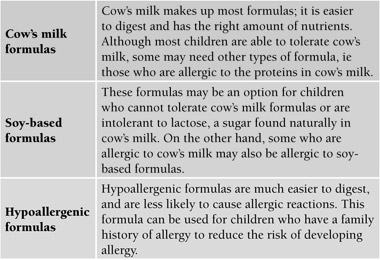When looking to fortify your child’s nutrition, you may get a bit cross-eyed with all the options available in the market. Milk alone can get you quite confused. Should you get whole milk or skimmed milk? Is flavoured milk suitable for young children? What about evaporated milk and condensed milk, are these milk safe for consumption? There are also many different types of formula milk, fortified with various nutrients. So which of these is the best for your child?
Whole and skimmed – which is better?
Whole milk. Whole milk, also known as full cream milk, is collected straight from the dairy herd. It has nothing added nor removed from it and is processed to kill any harmful microorganisms for safe consumption. Whole milk is highly recommended for growing children as it contains at least 3.5% of fat, which is important for growth and development.
Skimmed milk. This type of milk has already been processed to have most of or all of its fat content removed. Skimmed milk has reduced levels of fat-soluble vitamins, especially vitamin A, due to the reduced levels of fat. Because of this, skimmed milk is not recommended for children as the low levels of fat reduce calorie content as well. However, children who are overweight or have other health concerns may replace whole milk with low fat milk in their diet where necessary. Do consult with your doctor before making the change for your child.
Fortified formula milk
Formula milk usually comes in powdered forms and are fortified with various additional nutrients, such as vitamins A, B and E, calcium, zinc, iron and magnesium. Some milk are also fortified with the fatty acids DHA and AA, which are claimed to help improve brain development for younger children, while some come enriched with pre- and pro-biotics to promote the growth of healthy bacteria in the intestines. In general, there are three major types of formula or growing up milk:
Although some formula milk may be a bit more expensive than others, all formula milks are required to meet strict nutritional standards. Therefore, most milk contain the same nutrients, regardless the brand.
Should your child be drinking these?
- Flavoured milk is a favourite among young children, as the milk is added with chocolate, vanilla or strawberry flavouring for better taste. However, this milk may not be suitable for very young children as it has higher sugar content and lower fat content. Older children may drink flavoured milk once in a while, as it still contains nutrients and is a healthier choice compared with carbonated and sugary drinks.
- Evaporated milk is very highly concentrated milk and needs to be diluted to lower the concentration of protein and minerals before it can be consumed. It also contains fat that is less well absorbed by children, compared with other kinds of milk.
- Condensed milk can be kept for longer periods, as it is well preserved. However, it is preserved with sugar, and thus carries a very high sugar content of at least 40-45%. This makes condensed milk generally unsuitable for consumption by children.
Most milk, in general, have all the nutrients that are necessary for the growth and development of young children. Brain development, as well as health and optimal growth do not solely depend on milk. It is a combination of a balanced and varied diet, so your child can get all the nutrients that he needs. Choose the milk that you think is most appropriate for your child, taking into account the sugar and fat content and of course your budget! It is not necessary to spend a lot to get the best nutrition for your child.







Comments